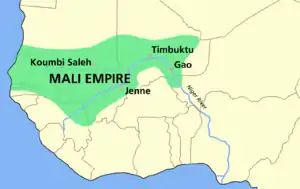Mansa (title)
Mansa (PL mansaw), a Maninka[1] and Mandinka[2] word for a ruler, is sometimes translated as "king",[3][4][5] but correctly means "king of kings" or "emperor".[6] It is particularly known as the title of the rulers of the Mali Empire, such as Mansa Musa, and in this context is sometimes translated as "emperor".[7]
.jpg.webp)
The word mansa (Arabic: منسا, romanized: mansā) was recorded in Arabic during the 14th century by North African writers such as Ibn Battuta and Ibn Khaldun, who explained it as meaning "sultan".[8] Cognates of mansa exist in other Mandé languages, such as Soninke manga, Susu menge, and Bambara masa.[1] According to Misiugin and Vydrin, the original meaning of the root word was probably "chief of hunters" or "chief of warriors".[1] An alternate translation of mansa, which Jansen attributes to the followers of Marcel Griaule, is that mansa means "god", "the divine principle", or "priest-king". Jansen notes that they have not provided their reasoning for choosing this translation.[4]
Empresses of the Mali Empire, such as Kassi, used the title Qasa instead of mansa.
List of Mansas
See also
- Emperor
- Faama, the title of king in the pre-imperial Mali
- Mali Empire
- Sundiata Keita, the first monarch to assume the title Mansa as "faama of faamas (king of kings)"
References
- Misiugin & Vydrin 1993, p. 105.
- Schaffer 2005, p. 333.
- Macbrair 1839, p. 40.
- Jansen 1998, p. 256.
- Conrad & Condé 2004, pp. xv, 198–199.
- Jr, Henry Louis Gates (2017-10-24). 100 Amazing Facts About the Negro. Knopf Doubleday Publishing Group. p. 182. ISBN 978-0-307-90872-8.
Mansa means "king of kings" or "emperor," and Musa's empire extended from the Atlantic Ocean to the Niger River.
- Sutton 1997, p. 221.
- Levtzion & Hopkins 2000, pp. 289, 333.
Works cited
- Conrad, David C.; Condé, Djanka Tassey (2004). Sunjata: a West African epic of the Mande peoples. Indianapolis: Hackett. ISBN 0-87220-697-1.
- Jansen, Jan (1998). "Hot Issues: The 1997 Kamabolon Ceremony in Kangaba (Mali)". The International Journal of African Historical Studies. 31 (2): 253–278. doi:10.2307/221083. hdl:1887/2774. ISSN 0361-7882. JSTOR 221083.
- Levtzion, Nehemia; Hopkins, John F. P., eds. (2000) [1981]. Corpus of Early Arabic Sources for West Africa. New York, NY: Marcus Weiner Press. ISBN 1-55876-241-8.
- Macbrair, R. Maxwell (1839). A grammar of the Mandingo language: with vocabularies. London.
- Misiugin, Viacheslav M.; Vydrin, Valentin F. (1993). "Some archaic elements in the Manden epic tradition: the «Sunjata Epic» case". St. Petersburg Journal of African Studies. 2: 98–111. ISSN 1025-4544.
- Schaffer, Matt (2005). "Bound to Africa: the Mandinka Legacy in the New World". History in Africa. 32: 321–369. doi:10.1353/hia.2005.0021. eISSN 1558-2744. ISSN 0361-5413. S2CID 52045769. Retrieved 2022-04-13.
- Sutton, J. E. G. (1997). "The African Lords of the Intercontinental Gold Trade Before the Black Death: al-Hasan bin Sulaiman of Kilwa and Mansa Musa of Mali". The Antiquaries Journal. 77: 221–242. doi:10.1017/S000358150007520X. eISSN 1758-5309. ISSN 0003-5815. S2CID 129875132.
